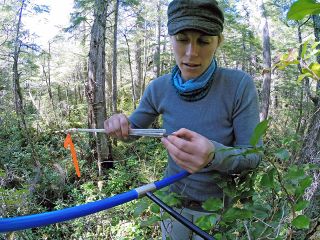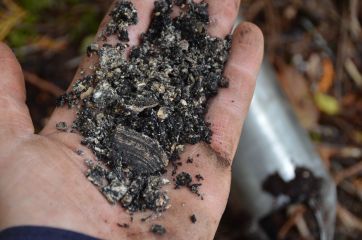
Fires among tools of First Nations forestry
Two recently published research papers show how coastal forests benefited from First Nations habitation, and that fire-management was an important element of Indigenous forestry.

Two recently published research papers show how coastal forests benefited from First Nations habitation, and that fire-management was an important element of Indigenous forestry.

A new study published Aug. 30 in Nature Communications shows for the first time that trees near former First Nations villages on BC’s Central Coast have grown taller, wider and healthier than those in the surrounding forest.

Combined with the impacts of climate change and deforestation, the coastal regions of southern BC are very likely to be hit by a worse drought within the coming decades than any time in the last three to four centuries, according to a new report co-authored by graduating PhD student Bethany Coulthard at the University of Victoria.
Combined with the impacts of climate change and deforestation, the coastal regions of southern BC are very likely to be hit by a worse drought within the coming decades than any time in the last three to four centuries, according to a new report co-authored by recent PhD graduate Bethany Coulthard at the University of Victoria.
Scientists have found that trees are growing faster in BC due to global warming, which counters the carbon-loss impacts of the province’s devastating mountain pine beetle outbreak.
Five issues of critical importance to British Columbia—transportation, electrical grid integration, energy efficient buildings, forestry, and natural gas development—form the basis for five major projects from PICS to be underway May 1.
Dr. Christoph Borchers, director of the UVic-Genome BC Proteomics Centre, has been jointly appointed as the Proteomics Chair for the Jewish General Hospital at McGill University in Montreal. Borchers is an expert in the use of mass spectrometry to study the structure and function of proteins. At the UVic centre, Borchers directs a research program that applies proteomics technologies to areas such as medical diagnostics, drug development, forestry and alternative fuels.
A major new study announced today will help ensure one of British Columbia’s (BC’s) most important sectors–forestry–can endure under a changing climate, and even help slow down the rate of global warming.
A renewable fuel called biochar could substitute for all coal and some natural gas burned in BC resulting in as much as a 22 per cent reduction in BC's greenhouse gas emissions, according to a new policy paper from PICS.